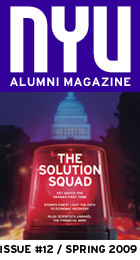expert advice
Letters to the President
Since January, our new commander-in-chief has famously lent an ear to
both critics and allies. Here’s advice
from some of NYU’s own experts
ECONOMICS: DEBT OF RECKONING
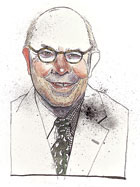
Dear Mr. President,
The two most pressing
economic problems are pretty clear to Americans: the breakdown of our (and the world’s) financial system and the nasty recession that has resulted.
Our government has responded to these crises in time-tested
ways. The Federal Reserve has
acted as a “lender of last resort,” the Treasury has invested hundreds of billions in financial institutions, and your administration, working with Congress, has fashioned an economic stimulus package calling for public spending and taxpayer relief. These measures, if history is a guide, will restore the functioning of our financial system. Financial meltdowns and recessions do happen, but they also go away.
The cost of this fight, and victory, however, is likely to come to something in the trillions of dollars. We will see the national debt rise by that amount, and we will pay the interest on that increased debt for years to come. Social Security and Medicare spending are also likely to increase at even faster rates in the years ahead, as more and more of the baby boomers retire. The yet unfunded liabilities of these programs run into the tens of trillions of dollars, and they beg for reform as Americans are living and working longer. Should we raise the age at which Social Security retirement benefits begin? Should we ask those who can afford to do so to draw less from Social Security and to pay more of their Medicare costs?
Foreign hands hold much of our debt, which makes it all the more necessary to right our fiscal house. If we are tempted to lighten the real burden of public debt via inflation, foreigners are likely to reduce their holdings, and also to avoid relying on the dollar as a world currency.
Mr. President, we face a ticking fiscal time bomb, made worse by the current financial predicament. So far, politicians and most of the rest of us have ignored it. As our current economic problems recede over the next four years, I hope that you will lead a public discussion of our long-term challenges and how they can be solved.
Sincerely,
Richard Sylla
Henry Kaufman Professor of the
History of Financial Institutions
and Markets, Leonard N. Stern School of Business
NATIONAL SECURITY: A FAREWELL TO NUCLEAR ARMS
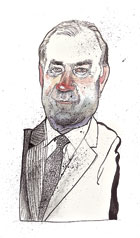
Dear Mr. President,
As you said at Grant Park last November, your election victory was a triumph for the American people. They showed that
they want change, and that they reject the use of fear in the justification of policies or the manipulation of opinions, which had come to characterize so much of the public discourse. The people expect you to take bold steps.
In your speech in Prague, you took exactly one such bold step: the proposal to eliminate all nuclear weapons. As you recognize, as long as nuclear weapons exist, they will proliferate amongst states—and possibly nonstate groups. Experts agree that use of them is inevitable, whether by accident or decision, and any use would constitute an environmental, political, and moral catastrophe.
The arguments typically advanced against elimination—it can’t be done, others would cheat, we need them to fight terrorists—are, to put it mildly, empty. The deterrence-of-terrorism argument is particularly egregious given the fact that we have developed extraordinarily capable conventional weapons to more effectively combat terrorists’ guerilla methods of attack. As I recall, we had plenty of nuclear weapons on 9/11. More to the point, the only way terrorists will acquire such weapons is from those who, like us, continue to possess them.
There is another reason for removing this intolerable danger: energy. Many countries have turned to nuclear power as an alternative to costly, polluting petroleum products. But this must not be permitted to increase the proliferation of nuclear weapons.
Reliable surveys show that some 73 percent of Americans and 63 percent of Russians already support elimination. There are concrete steps that could be taken immediately to safely and progressively curb these weapons, including urging Congress to ratify the Comprehensive Nuclear-Test-Ban Treaty, negotiating a treaty that prohibits any further manufacture of weapons-grade fissile material, and cooperating with the Russians to take all strategic missiles—some 1,500 on both sides—off of hair-trigger alert. Another important step is to renew the Strategic Arms Reduction Treaty, which expires at the end of 2009, but with much lower levels of weapons systems.
You and your team have already made strides toward these ends. The leadership you have shown in calling the world to this task is crucial. The way ahead will be tough and you have many other pressing issues on your agenda. But there’s a saying: If you’ve got a big problem demanding immediate action, give it to a busy man.
Godspeed you.
Ambassador
Richard Butler, AC
Global Diplomat in Residence,
Center for Global Affairs, School of Continuing and Professional Studies
EDUCATION: FROM CLINIC TO CLASSROOM

Dear Mr. President,
Congratulations! As promised
in your campaign, you have already launched an ambitious education agenda, including supporting early childhood education, reforming the No Child Left Behind Act, addressing the dropout crisis, recruiting and retaining teachers, and expanding afterschool programs.
These are all worthy initiatives, but in order to tackle any of them, policymakers and teachers need usable knowledge about how children learn and what teaching methods get the best results. Should a teacher, for example, give homework to first-graders and, if so, what kind and how much? What’s the best way to introduce fractions to fourth-graders—or teach high school students who failed to learn fractions earlier? How can we help hyperactive children pay attention? Teachers grapple with these questions daily and research can point out clear directions for their decision-making.
However, in education, we have a “clinical lab to classroom” gap. Vital knowledge too often remains with the researchers, unavailable to those in positions to help children and youth. One of your priorities these next four years should be to promote research that easily translates to classrooms by reauthorizing the Department of Education’s Institute of Education Sciences (IES) and increasing its funding. Just as in medicine, where researchers are now working to overcome their own “bench to bedside” gap, the federal government and universities must ensure with the same urgency and concern that education research translates to practice.
Funding will be critical. The IES budget for 2008 was less than 1 percent of the $59.2 billion appropriated to the Department of Education. Mr. President, you have already nearly doubled the department’s budget, but I urge you to also double the current funding for the IES. If we spend modest amounts on education research, we will know how to invest in reforming our educational system. Without this, we will continue to blindly throw money at our problems.
Sincerely,
Mary M. Brabeck, PHD
Dean and Professor of Applied
Psychology, Steinhardt School of
Culture, Education, and Human
Development
HEALTH CARE: UNIVERSAL OVERHAUL
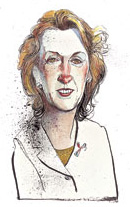
Dear Mr. President,
Health-care reform is a tough issue in the United States, and while there have been windows of opportunity
for change before, this time is different. You have a mandate:
Exit polls showed health care to be the No. 3 issue of concern to voters after the economy and the war in Iraq, and 75 percent of voters think the federal government should play a more active role. So, what should the priorities be?
First, starting with the personal health-care system, most Americans want to see the uninsured provided with coverage, and many say that they’re willing to pay more taxes to make it happen. Efforts toward a universal policy could move quickly through incremental coverage programs such as the State Children’s Health Insurance Program, offering buy-in to Medicare for people 55 and older, and extending the age of young adults who can be covered by their parents’ plans up to the age of 30. Then we face the hard questions about strategies to cover those left out and the role that government can play to include them.
Second, we spend more than any other country on health care—more than $7,000 per person each year—but the return is disappointing. Among the 30 countries in the Organisation for Economic Co-operation and Development, the American system is the most expensive and least efficient. Our infant mortality and life expectancy rank 27th and 21st, respectively. Why have our investments brought poor results? One reason is that access to medical care is not the major factor in health. It accounts for only about 10 percent of avoidable mortality in the United States but attracts more than 95 percent of health dollars. Health-care reform must spend more on primary care and prevention, as well as on community-based programs in areas such as tobacco use prevention, and healthy diet and exercise promotion, which save nearly $6 in health-care costs for every dollar invested.
Finally, the public needs to understand that health is everyone’s business! As you have said, it is an economic issue, an educational issue, and an environmental issue, and your attention to strengthening these sectors and communicating these links will be critical to improving health for all.
Sincerely,
Jo Ivey Boufford
Professor of Health Policy and Public Service, Robert F. Wagner Graduate School of Public Service, and
President of The New York
Academy of Medicine
CIVICS: ON GOVERNMENT SERVICE
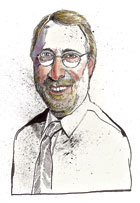
Dear Mr. President,
The federal government’s 1.8 million civil
servants are ready to be called again to
faithfully execute the laws and to be partners
in changing the way Washington works.
All you have to do is ask.
First, you should speak to federal employees as a whole. George W. Bush mostly ignored the federal service. He made dozens of speeches to uniformed officers involved in the war on terrorism but never asked for sacrifice from the civil service. Interviewed in 2002, 65 percent of defense department civil servants said they felt a new sense of urgency after September 11th, while just 35 percent of their colleagues in the domestic departments agreed.
Second, you should cut the number of political appointments at the top of government. You have already promised to cut middle managers, but remember that between a quarter and two-fifths of the stultifying management layers in government are occupied by political appointees, including more than 2,000 that you will appoint without Senate confirmation. There are plenty of career senior executives who could fill these positions. Doing so would signal that bloat is bloat at whatever level it occurs.
Third, you should hire at least 100,000 front-line servants for beleaguered agencies that no longer have enough staff to handle their responsibilities. The U.S. Food and Drug Administration needs inspectors to intercept counterfeit drugs and poisoned peppers; the Social Security Administration needs representatives to handle the surge in disability claims; the Internal Revenue Service needs agents to collect more than $300 billion in delinquent taxes. And they are hardly alone. Name a front-line agency, such as the Veterans Benefits Administration, and the shortages are palpable. They need new employees and fast.
For inspiration, you might look to George H.W. Bush, who considered himself a product of the federal service and made every effort to engage them. The first president Bush met with senior executives immediately after his inauguration in 1989. The sooner you call on the federal service for commitment, the sooner they will respond.
Sincerely,
Paul C. Light
Paulette Goddard Professor of
Public Service, Robert F. Wagner Graduate School of Public Service
Illustrations by Jack Unruh
